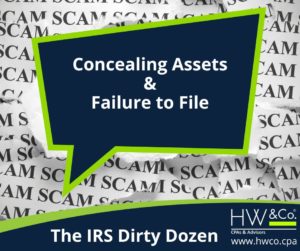In this article, we present two more scams from the IRS’ 2022 Dirty Dozen list. These involve tax evasion. Read on so you don’t fall victim to these schemes.
9: Concealing Assets
The IRS remains focused on stopping tax avoidance by those who hide assets in offshore accounts and in accounts holding cryptocurrency or other digital assets.
International tax compliance is a top priority of the IRS. New patterns and trends emerging in complex international tax avoidance schemes and cross-border transactions have heightened concerns regarding the lack of tax compliance by individuals and entities with an international footprint. As international tax and money laundering crimes have increased, the IRS continues to protect the integrity of the U.S. tax system by helping American taxpayers to understand and meet their tax responsibilities and by enforcing the law with integrity and fairness, worldwide.
Over the years, numerous individuals have been identified as evading U.S. taxes by attempting to hide income in offshore banks, brokerage accounts or nominee entities. They then access the funds using debit cards, credit cards, wire transfers or other arrangements. Some individuals have used foreign trusts, employee-leasing schemes, private annuities and structured transactions attempting to conceal the true owner of accounts or insurance plans.
U.S. persons are taxed on worldwide income. The mere fact that money is placed in an offshore account does not put it out of reach of the U.S. tax system. U.S. persons are required, under penalty of perjury, to report income from offshore funds and other foreign holdings. The IRS uses a variety of sources to identify promoters who encourage others to hide their assets overseas.
Digital assets are being adopted by mainstream financial organizations along with many other parts of the economy. The proliferation of digital assets across the world in the last decade or so has created tax administration challenges regarding digital assets, in part because there is an incorrect perception that digital asset accounts are undetectable by tax authorities. Unscrupulous promoters continue to perpetuate this myth and make assertions that taxpayers can easily conceal their digital asset holdings.
The IRS urges taxpayers to not be misled into believing this storyline about digital assets and possibly exposing themselves to civil fraud penalties and criminal charges that could result from failure to report transactions involving digital assets.
“The IRS is able to identify and track otherwise anonymous transactions of international accounts as well as digital assets during the enforcement of our nation’s tax laws,” Rettig said. “We urge everyone to come into compliance with their filing and reporting responsibilities and avoid compromising themselves in schemes that will ultimately go badly for them.”
10: Failure to File Tax Returns
The IRS continues to focus on people who choose to ignore the law and not file a tax return, especially those individuals earning more than $100,000 a year.
Taxpayers who exercise their best efforts to file their tax returns and pay their taxes, or enter into agreements to pay their taxes, deserve to know that the IRS is pursuing others who have failed to satisfy their filing and payment obligations. The good news is most people file on time and pay their fair share of tax.
Those who choose not to file a return even when they have a legal filing requirement, and especially those earning more than $100,000 per year who don’t file, represent a compliance problem that continues to be a top priority of the IRS.
Here’s a key reminder for taxpayers who may be wrongly persuaded that not filing their return is a smart move. The Failure to File Penalty is initially much higher than the Failure to Pay Penalty. It is more advantageous to file an accurate return on time and set up a payment plan if needed than to not file. The Failure to File Penalty is generally 5% of the unpaid taxes for each month or part of a month that a tax return is late. The penalty generally will not exceed 25% of unpaid taxes. The Failure to Pay Penalty is generally 0.5% of the unpaid taxes for each month or part of a month the tax remains unpaid. The penalty will not exceed 25% of unpaid taxes.
If a person’s failure to file is deemed fraudulent, the penalty generally increases from 5 percent per month to 15 percent for each month or part of a month the return is late, with the maximum penalty generally increasing from 25 percent to 75 percent.
Please visit the IRS website or contact an HW&Co. Advisor today for more information.
Keep reading for more of the IRS Dirty Dozen list.




